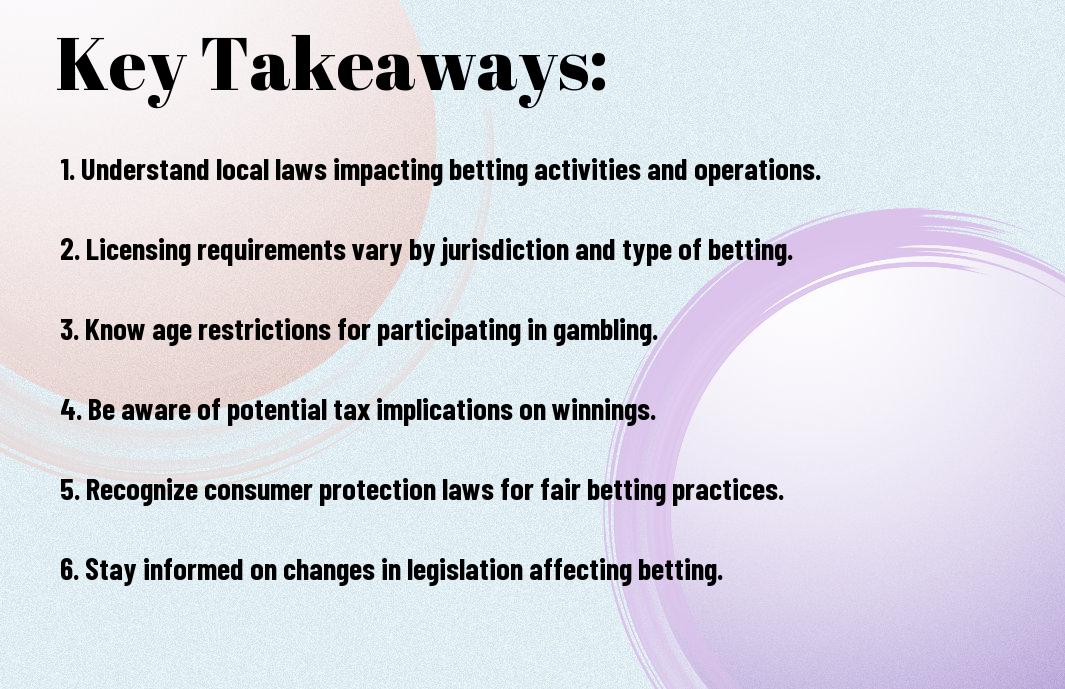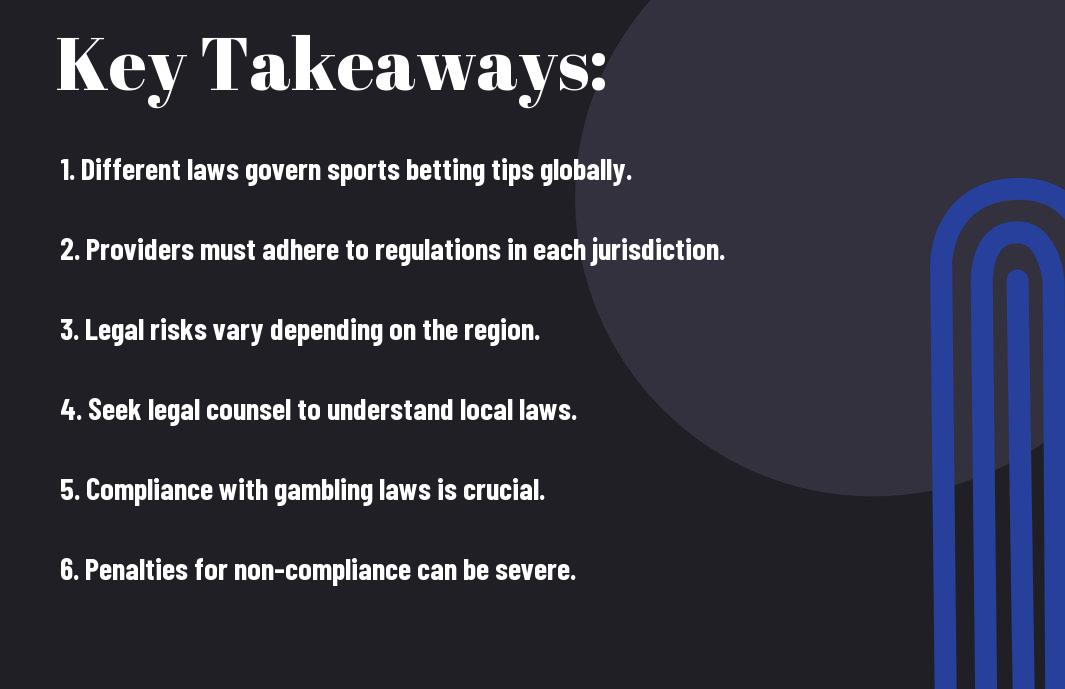As you navigate the world of betting, your understanding of the legal landscape is vital to ensuring a safe and successful experience. You need to be aware of the regulations that govern betting in your region, as they can impact your ability to place bets and access certain platforms. Your knowledge of these laws will help you make informed decisions and avoid potential pitfalls, allowing you to focus on making smart bets and enjoying the experience.
Key Takeaways:
- Understanding the legal landscape of sports betting is crucial for bettors to navigate the industry safely and avoid potential pitfalls, including legal repercussions and financial losses.
- Bettors should be aware of the regulations and laws governing sports betting in their jurisdiction, as these can vary significantly from one region to another and impact the availability of betting options.
- Knowledge of licensing and regulatory bodies is vital, as it ensures that bettors are using reputable and trustworthy platforms that adhere to strict standards of fairness and security.
- Bettors need to be informed about the tax implications of their winnings, as sports betting income is subject to taxation in many jurisdictions, and failure to comply with tax laws can result in severe penalties.
- Familiarity with consumer protection laws and dispute resolution processes is also important, as it provides bettors with recourse in case of disputes with betting operators or other issues related to their betting activities.


Legal Framework
While navigating the world of betting, you need to understand the legal framework that governs your activities. This framework is composed of federal and state laws that regulate betting operations, ensuring fairness and transparency.
Federal Betting Laws
Although federal laws provide a foundation for betting regulations, you should be aware that these laws can be complex and subject to change. You must stay informed about federal betting laws to ensure you are in compliance.
State-Level Regulations
Regarding state-level regulations, you will find that these rules vary significantly from one state to another. You need to familiarize yourself with the specific regulations in your state to avoid any potential issues.
The state-level regulations you need to know about will depend on where you live and bet. You should check your state’s gaming commission website to learn more about the specific laws and regulations that apply to your betting activities, as this will help you make informed decisions and avoid any potential problems.
Compliance Requirements
Assuming you’re interested in betting, you need to understand the regulations surrounding it. Compliance requirements are in place to protect you and ensure fair play.
Licensing Procedures
Across various jurisdictions, you’ll find that licensing procedures differ. You should familiarize yourself with the specific requirements in your area to avoid any issues.
Operating Standards
Alike other industries, betting operators must adhere to certain standards. You can expect these standards to cover aspects such as data protection and customer support, which affect your betting experience.
Plus, when it comes to operating standards, you should know that they are regularly reviewed and updated to reflect changes in the industry. You can check with your local regulatory body to stay informed about the latest developments and ensure that your betting activities are compliant with the current regulations, protecting your rights as a bettor.
Risk Management
Despite the excitement of betting, you must prioritize risk management to protect your finances and personal data. This involves setting limits, monitoring your activity, and being aware of the regulations in place to safeguard your interests.
Financial Reporting
For your own protection, you should familiarize yourself with the financial reporting requirements of your betting operator, ensuring transparency and accountability in your transactions.
Identity Verification
Below the surface of betting regulations, identity verification is a process you will encounter, designed to ensure the security and integrity of your account and transactions.
To further understand identity verification, you should know that it typically involves providing documentation to confirm your age, identity, and residence, which helps prevent fraud and underage betting, ultimately protecting you and your funds from potential risks and ensuring a safe betting experience.
Jurisdictional Considerations
Once again, you need to consider the laws and regulations of your location when engaging in betting activities. Your jurisdiction’s rules can affect your ability to participate in certain types of betting, so it’s important to familiarize yourself with local laws.
Interstate Betting Rules
Among the various regulations you should be aware of are those governing interstate betting. You should know that some states have specific rules regarding betting across state lines, which can impact your betting activities.
International Restrictions
Betting laws vary significantly across countries, and you must comply with the regulations of your country and the country where the betting operator is based. You should be aware of these restrictions to avoid any potential issues.
Understanding international restrictions is vital to ensure you’re not inadvertently breaking any laws. You should research the specific laws and regulations of the countries involved in your betting activities to avoid any potential consequences, and ensure that your betting activities are compliant with all applicable laws and regulations, protecting your interests and your funds.
Player Protection
All bettors should be aware of the regulations in place to protect them. You can find a Worldwide Guide to Legal Sports Betting: Regulations by Country at this link to learn more about your rights.
Responsible Gaming Measures
Beneath the surface of player protection lies a range of measures to promote responsible gaming. You will find that many operators offer tools to help you manage your betting habits and stay in control.
Privacy Requirements
By law, operators must protect your personal data and ensure that your information is secure. You have the right to know how your data is being used and to have control over your privacy settings.
Protection of your personal data is a top priority for regulators, and you should expect operators to adhere to strict standards when handling your information, ensuring that your privacy is respected and your data is secure, giving you peace of mind when betting online.
Enforcement Actions
Keep in mind that regulatory bodies take enforcement actions against operators who fail to comply with regulations. You need to understand the consequences of non-compliance to avoid any issues with your betting activities.
Common Violations
Violating regulations can lead to severe consequences, and you should be aware of common infractions, such as unauthorized betting operations or misleading advertising, to ensure your protection and the integrity of the industry.
Penalties and Sanctions
With regulatory bodies having the power to impose penalties, you may face fines, license suspension, or even revocation, depending on the severity of the infraction, which can impact your betting experience and the overall industry.
Hence, it is crucial to understand the penalties and sanctions that can be imposed on operators, as this knowledge will help you make informed decisions and avoid any potential risks associated with non-compliant operators, ensuring a safe and secure betting environment for you.
Conclusion
To wrap up, you now have a better understanding of the legal insights surrounding betting regulations. You can navigate the complex world of online betting with confidence, knowing your rights and obligations. Your awareness of these regulations will help you make informed decisions and avoid potential pitfalls, ensuring a safer and more enjoyable betting experience for you.
FAQ
Q: What are the key regulations that bettors should be aware of when it comes to online betting?
A: Bettors should be aware of regulations such as the Wire Act, the Unlawful Internet Gambling Enforcement Act (UIGEA), and the General Data Protection Regulation (GDPR). The Wire Act prohibits the transmission of sports bets across state lines, while the UIGEA restricts online gambling transactions. The GDPR, on the other hand, protects the personal data of bettors. Additionally, bettors should also be aware of the specific laws and regulations in their jurisdiction, as these can vary significantly.
Q: How do betting regulations vary from country to country, and what are the implications for bettors?
A: Betting regulations vary significantly from country to country, with some countries having strict laws and regulations, while others have more relaxed laws. For example, some countries have laws that prohibit online betting altogether, while others have laws that allow online betting but with certain restrictions. Bettors should be aware of the laws and regulations in their country of residence, as well as the country where the online betting operator is based. This is because bettors may be subject to the laws and regulations of both countries, and non-compliance can result in penalties or even account closure.
Q: What are the consequences for bettors who violate betting regulations, and how can they ensure compliance?
A: The consequences for bettors who violate betting regulations can be severe, including fines, penalties, and even account closure. In some cases, bettors may also be subject to criminal prosecution. To ensure compliance, bettors should familiarize themselves with the laws and regulations in their jurisdiction, as well as the terms and conditions of the online betting operator. They should also ensure that they are of legal age to bet, and that they are not betting on events or sports that are prohibited in their jurisdiction. Additionally, bettors should keep records of their betting activities, including receipts and transaction records, in case of any disputes or audits.




